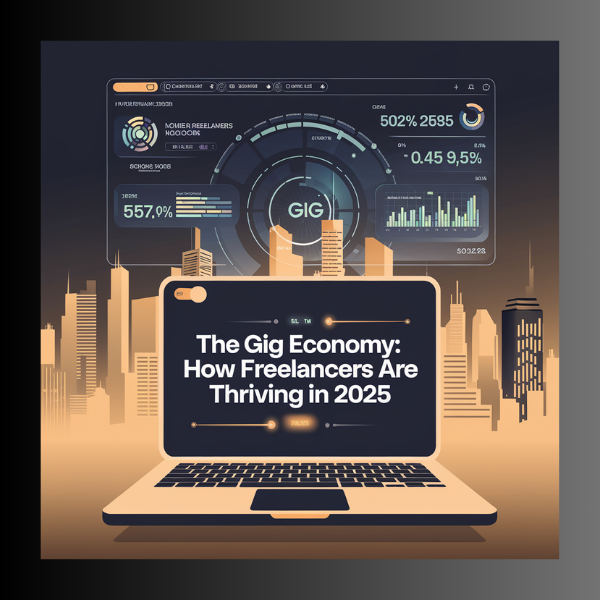The traditional 9-to-5 grind is fading, replaced by a dynamic landscape of independent work. The gig economy, once a fringe concept, has exploded, empowering millions to forge their own career paths. In 2025, freelancers are not just surviving – they’re thriving. This article delves into the key factors driving this success and explores the evolving landscape of the gig economy.
1. The Rise of Remote Work:
The pandemic accelerated the shift towards remote work, blurring the lines between office and home. This has been a boon for freelancers, allowing them to work from anywhere with an internet connection.
- Increased Flexibility: Freelancers enjoy unparalleled flexibility in their work schedules, enabling them to prioritize personal commitments, travel freely, and maintain a healthier work-life balance.
- Expanded Opportunity Pool: The geographical limitations of traditional employment have vanished. Freelancers can now access a global marketplace, connecting with clients and collaborators across continents.
- Reduced Overhead Costs: Remote work eliminates the need for expensive office spaces, commuting costs, and professional attire, significantly reducing overhead expenses and increasing profitability.
2. Technological Advancements:
Technological advancements have revolutionized the way freelancers operate:
- Project Management Tools: Platforms like Asana, Trello, and Monday.com facilitate seamless collaboration and project management, ensuring efficient workflows and clear communication with clients.
- Communication & Collaboration Tools: Tools like Slack, Zoom, and Google Meet enable real-time communication and virtual meetings, fostering a sense of community and facilitating collaborative projects.
- AI-Powered Tools: Artificial intelligence is automating repetitive tasks, freeing up freelancers to focus on higher-value work. AI-powered writing assistants, design tools, and research platforms are increasing productivity and enhancing the quality of work.
3. The Growing Demand for Specialized Skills:
The modern business world demands a diverse range of specialized skills. Freelancers, with their niche expertise, are perfectly positioned to fill these gaps:
- Digital Marketing: The demand for skilled digital marketers, including SEO specialists, social media managers, and content creators, continues to soar.
- Software Development: Skilled developers are highly sought after, with a constant need for web developers, mobile app developers, and data scientists.
- Creative Services: The creative industries, including graphic design, photography, videography, and writing, continue to thrive, offering numerous opportunities for freelance professionals.
4. The Rise of the “Freelancer-First” Economy:
Businesses are increasingly recognizing the value of a flexible workforce.
- Cost-Effectiveness: Hiring freelancers on a project-basis allows businesses to scale their workforce up or down as needed, reducing overhead costs and improving financial flexibility.
- Access to Specialized Talent: Freelancers provide access to a global pool of specialized talent, allowing businesses to quickly fill skill gaps and tap into expertise they may not have in-house.
- Increased Agility: The flexibility of the freelance workforce enables businesses to quickly adapt to changing market conditions and respond to emerging opportunities.
5. Building a Strong Online Presence:
In today’s digital age, a strong online presence is crucial for freelance success.
- Personal Brand Building: Freelancers are actively building their personal brands through professional websites, social media profiles, and online portfolios, showcasing their skills and expertise to potential clients.
- Content Marketing: Creating high-quality content, such as blog posts, articles, and videos, helps freelancers establish themselves as thought leaders in their field and attract potential clients.
- Networking & Community Building: Online platforms and communities provide opportunities for freelancers to connect with other professionals, share knowledge, and find new opportunities.
Challenges and Considerations:
While the gig economy offers numerous advantages, it also presents unique challenges:
- Income Insecurity: Income can fluctuate significantly for freelancers, requiring careful financial planning and budgeting.
- Lack of Benefits: Many freelancers lack access to traditional employee benefits such as health insurance, retirement plans, and paid time off.
- Competition: The competitive landscape can be fierce, requiring freelancers to constantly upskill and differentiate themselves from the competition.
The Future of the Gig Economy:
The gig economy is constantly evolving.
- The Rise of AI: AI will continue to play an increasingly important role, automating tasks, enhancing productivity, and creating new opportunities for freelancers.
- The Importance of Upskilling: Continuous learning and upskilling will be essential for freelancers to remain competitive and adaptable in a rapidly changing market.
- The Growth of the Platform Economy: Online platforms will continue to play a crucial role in connecting freelancers with clients, facilitating payments, and providing access to valuable resources.
The gig economy has transformed the way we work, empowering individuals to pursue their passions and build successful careers on their own terms. In 2025, freelancers are thriving, leveraging technology, embracing remote work, and building strong online brands. While challenges remain, the future of the gig economy looks bright, offering exciting opportunities for those who are willing to embrace the flexibility, independence, and entrepreneurial spirit of this dynamic new world of work.





